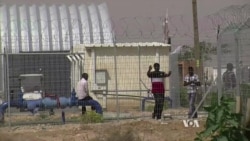An international human rights group has accused the Israeli government of coercing thousands of African asylum seekers to return home where, Human Rights Watch claims, they could face imprisonment and possible torture.
Some 2,000 African asylum seekers live at the Holot detention center in the southern Israeli desert. They can leave during the day but must report back three times a day.
Another 1,000 across the road at the Saharonim prison cannot leave. They are among more than 50,000 Africans, mostly from Sudan and Eritrea, who arrived in Israel over the past eight years.
Human Rights Watch said in a report released Tuesday that these migrants are not allowed to work and only a handful have been granted asylum. The group’s Bill Van Esveld said the Israeli government wants the Africans to leave.
"There's been a series of laws put in place that basically gives people the choice between being able to stay in Israel but potentially in indefinite detention, or being sent back to the country they came from… We think this constitutes effective ‘refoulement,’ which is a refugee law term that means you're being basically forced back to a country where you face a well-founded fear of some kind of persecution,” said Van Esveld.
Some Israelis say the influx threatens the very nature of the Jewish state. The government built a fence along the Egyptian border to keep them out.
"We are determined to remove those who succeeded in entering before we closed the border. I want to make clear that these are not refugees. We are talking about illegal workers infiltrating and we are determined to bring them to justice," said Prime Minister Benjamin Netanyahu.
Sudanese who return risk 10-year prison terms for traveling to Israel. And Eritreans face prison for evading mandatory military service. Nevertheless, nearly 7,000 have left.
Van Esveld said the policy needs to change.
"Give these people a year-long, renewable protected status that allows them to work and that allows them to be here legally and not subject to arbitrary detention. And make it renewable until such time as the situation in Eritrea and Sudan allows them to go," said Van Esveld.
Some Israelis do not want the Africans in their communities. But others support them, recalling their own past as refugees.





